Huberman GPT
Andrew Huberman, Ph.D., is a neuroscientist and tenured professor in the Department of Neurobiology and by courtesy, Psychiatry and Behavioral Sciences at Stanford School of Medicine. You can ask about:
- 💪 Supplementation
- ⚡️ ADHD, Drive and Motivation
- 🏋️♀️ Fitness and Recovery
- 🥶 Heat Exposure and Cold Exposure
- ☀️ Light Exposure
- 🪴 Mental Health and Addictions
- 🧠 Behavior Change
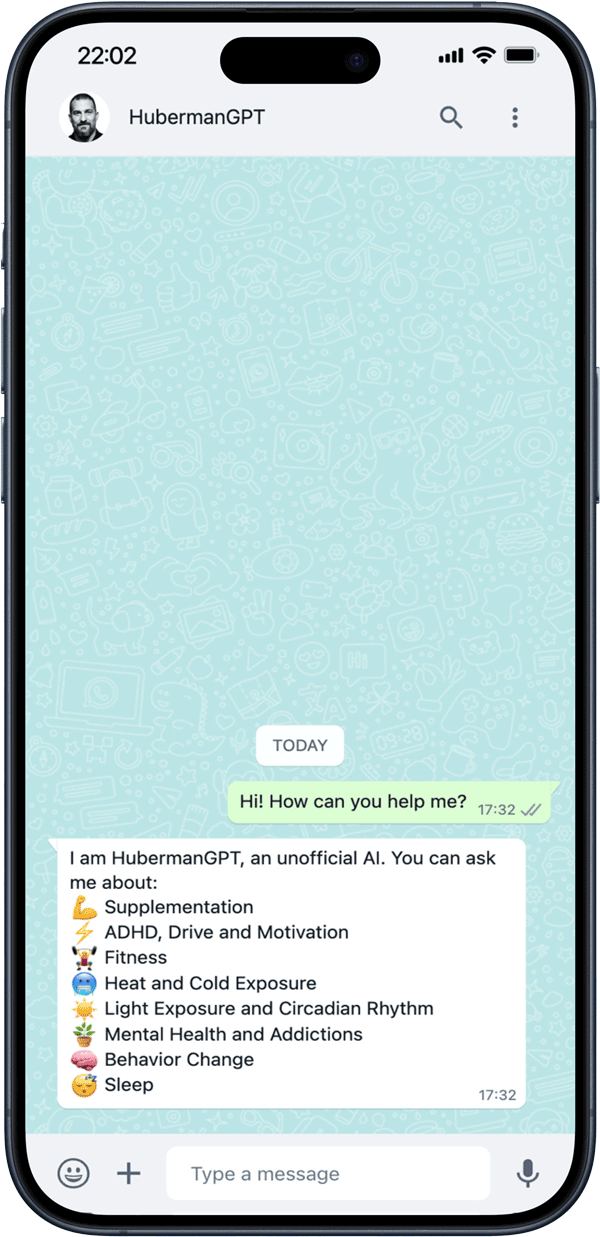

Andrew Huberman transcripts
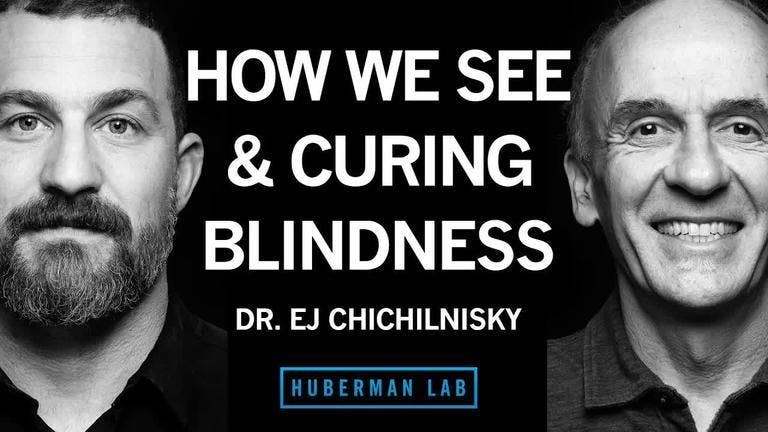
Dr. E.J. Chichilnisky: How the Brain Works, Curing Blindness & How to Navigate a Career Path
In this episode, my guest is Dr. E.J. Chichilnisky, Ph.D., professor of neurosurgery and ophthalmology at Stanford University, studying how we see and use that information to build artificial eyes to restore vision to people who are blind. We discuss how understanding the retina (the light-sensing brain tissue that lines the back of our eyes) is cr...
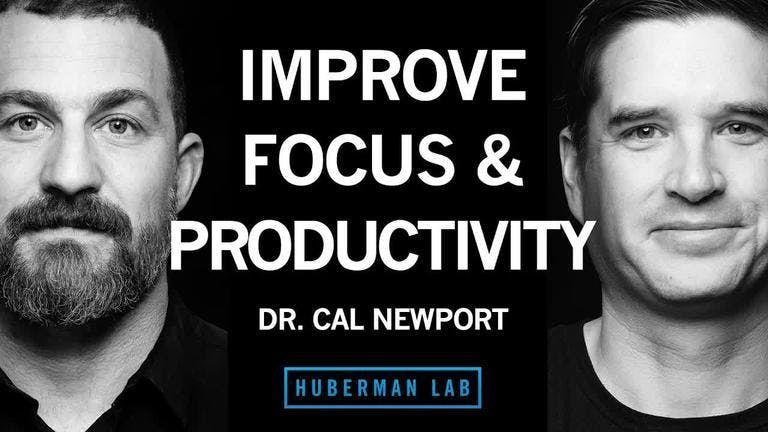
Dr. Cal Newport: How to Enhance Focus and Improve Productivity
In this episode, my guest is Dr. Cal Newport, Ph.D., a professor of computer science at Georgetown University and bestselling author of numerous books on focus and productivity and how to access the deepest possible layers of your cognitive abilities in order to do quality work and lead a more balanced life. We discuss how to avoid digital distract...
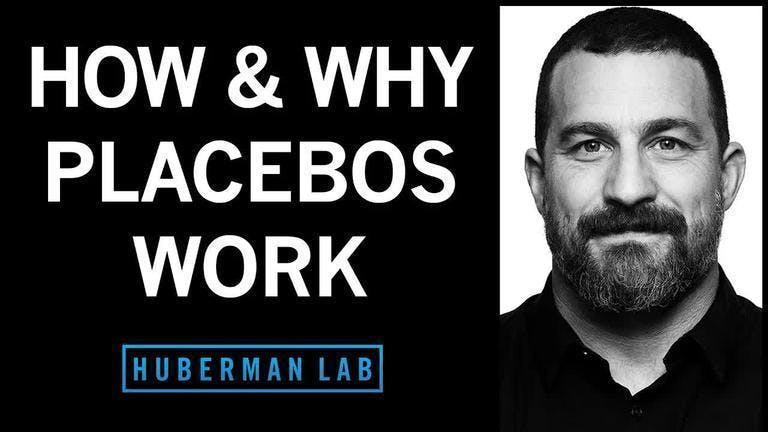
How Placebo Effects Work to Change Our Biology & Psychology
In this episode, I discuss placebo and belief and mindset effects — all of which exert a powerful and real influence on our biology and psychology. I discuss how your beliefs and expectation that a certain outcome will occur after taking a substance (or any intervention cause genuine changes in brain and bodily function. I discuss how placebos can ...
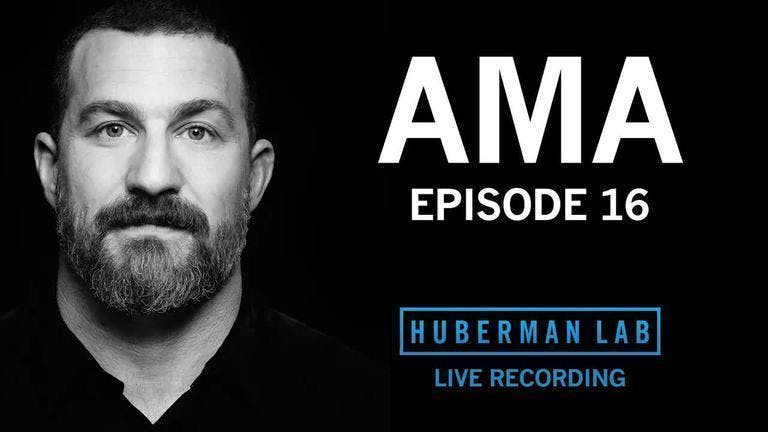
AMA #16: Sleep, Vertigo, TBI, OCD, Tips for Travelers, Gut-Brain Axis & More
Welcome to a special edition of the 16th Ask Me Anything (AMA) episode, part of Huberman Lab Premium, recorded in Sydney, Australia. This episode is a recording of a live stream AMA, originally exclusive to our Premium members. We've decided to make the full-length version available to everyone, including non-members of Huberman Lab Premium. Huber...
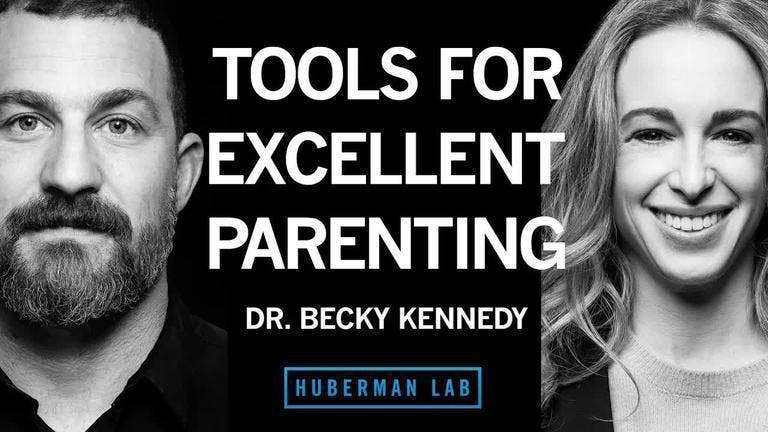
Dr. Becky Kennedy: Protocols for Excellent Parenting & Improving Relationships of All Kinds
In this episode, my guest is Dr. Becky Kennedy, Ph.D., a clinical psychologist, bestselling author, and founder of Good Inside, an education platform for parents and parents-to-be. We discuss actionable protocols for raising resilient, emotionally healthy kids and effective alternatives to typical forms of reward and punishment that instead teach c...
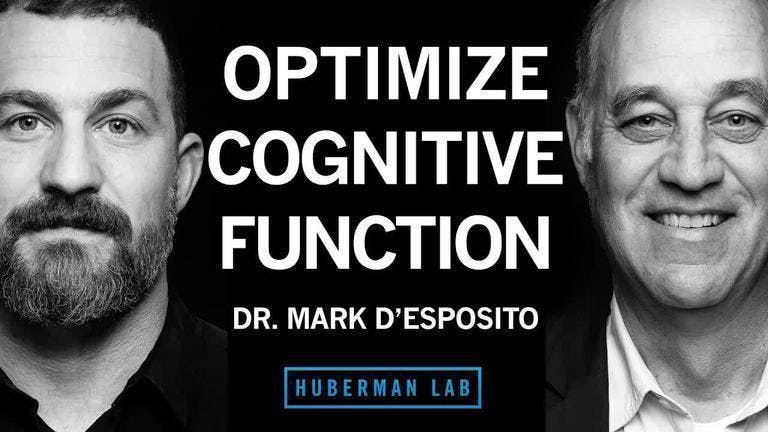
Dr. Mark D'Esposito: How to Optimize Cognitive Function & Brain Health
In this episode, my guest is Dr. Mark D'Esposito, M.D., a neurologist and professor of neuroscience and psychology at the University of California, Berkeley. We discuss the brain mechanisms underlying cognition and the forms of memory required for focus, productivity, planning and achieving goals, and learning. We discuss neurochemicals such as dop...
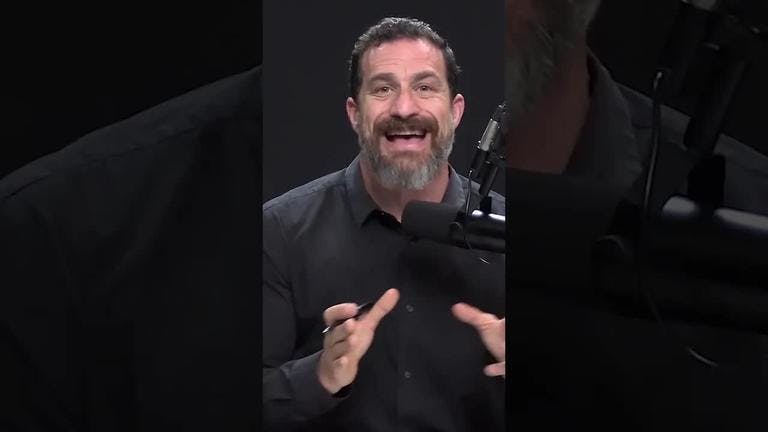
Oral Health Protocols
The new Huberman Lab episode is all about oral health. It covers everything from brushing and flossing, as well as how to repair cavities without drilling (which depends on how deep they are into the tooth, of course), as well as the oral microbiome, which is critical for whole body health, gum health, the legitimate concerns of being a mouth breat...
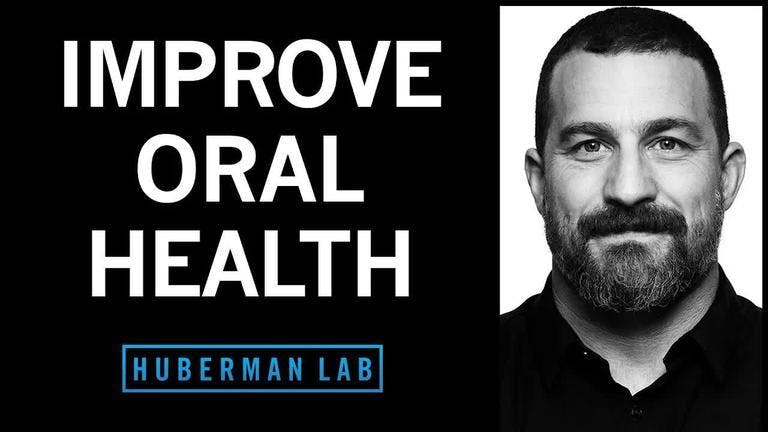
How to Improve Oral Health & It's Critical Role in Brain & Body Health
In this episode, I discuss the importance of oral health for dental and microbiome health and general physical and mental well-being. I explain science-supported protocols for strengthening your teeth and gums, including how to remineralize your teeth. I cover the best approaches and timing for brushing and flossing, tongue, gum, and oral microbiom...
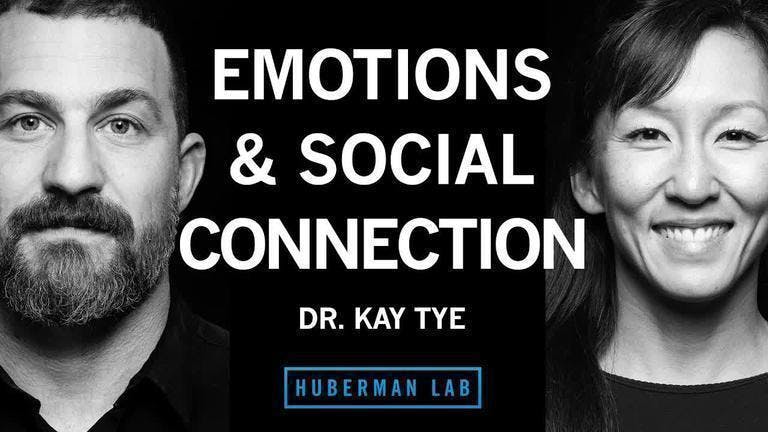
Dr. Kay Tye: The Biology of Social Interactions and Emotions
In this episode, my guest is Dr. Kay Tye, PhD, Professor of Systems Neurobiology at the Salk Institute for Biological Studies and a Howard Hughes Medical Institute (HHMI) Investigator. We discuss the neural circuit basis of social interactions and loneliness. We also discuss how animals and people establish themselves in a group hierarchy by rank a...
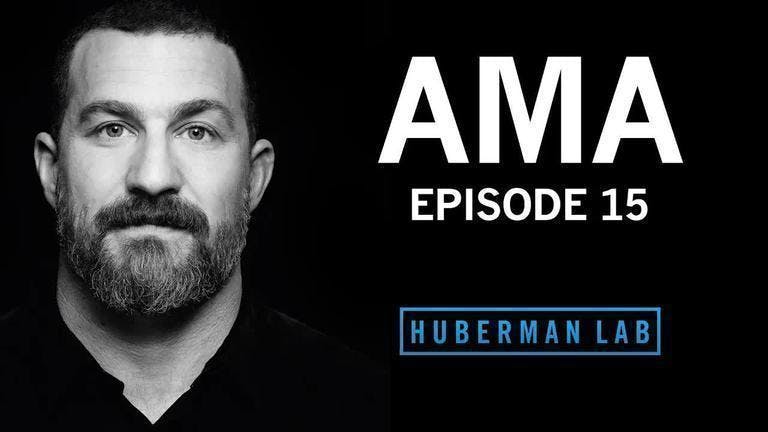
AMA #15: Fluoride Benefits/Risks & Vagus Nerve Stimulation
Welcome to a preview of the 15th Ask Me Anything (AMA) episode, part of Huberman Lab Premium. Huberman Lab Premium was launched for two main reasons. First, it was launched in order to raise support for the main Huberman Lab podcast — which will continue to come out every Monday at zero-cost. Second, it was launched as a means to raise funds for ...
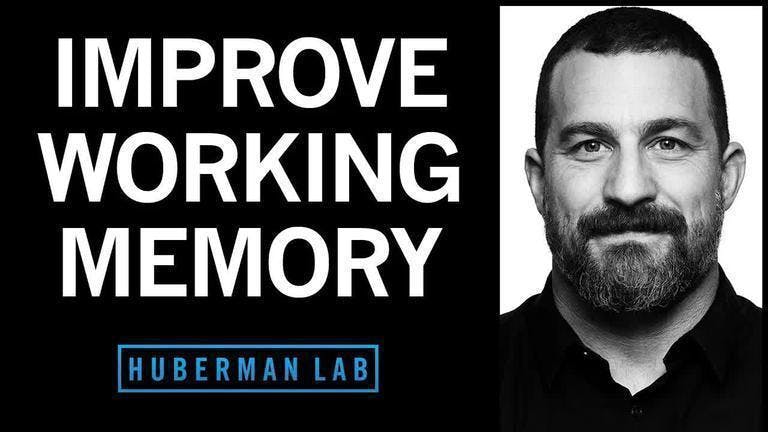
Tools to Enhance Working Memory & Attention
In this episode, I discuss working memory, which is critical for learning and productivity, strategy setting, goal seeking, and navigating new environments. I explain the key role of dopamine and the biological mechanisms underlying working memory and how working memory differs from both short- and long-term memory. I also describe science-support...
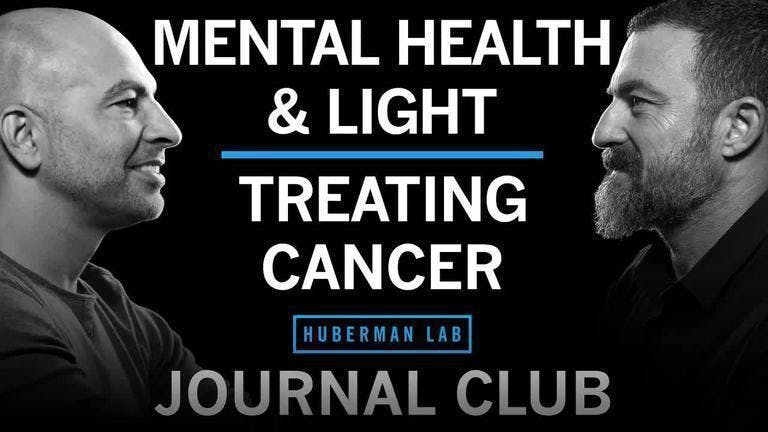
Journal Club with Dr. Peter Attia | Effects of Light & Dark on Mental Health & Treatments for Cancer
In this journal club episode, my guest is Dr. Peter Attia, M.D., a Stanford and Johns Hopkins-trained physician focusing on healthspan and lifespan and the host of The Drive podcast. We each present a peer-reviewed scientific paper chosen because it contains novel, interesting, and actionable data. First, we discuss a paper on how bright light ex...
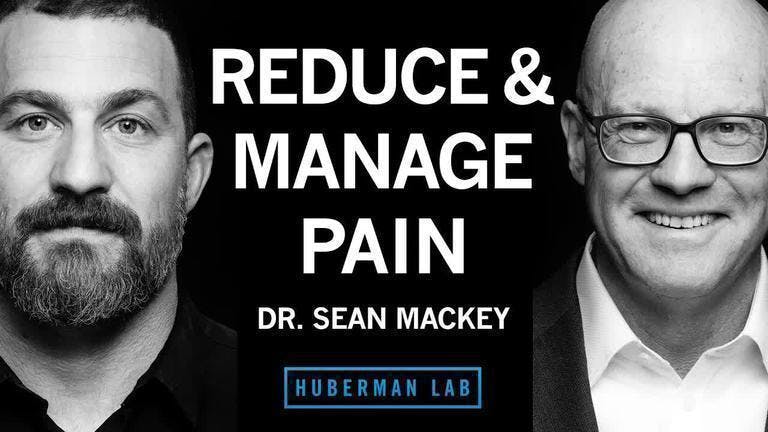
Dr. Sean Mackey: Tools to Reduce & Manage Pain
In this episode, my guest is Dr. Sean Mackey, M.D., Ph.D., Chief of the Division of Pain Medicine and Professor of Anesthesiology, Perioperative and Pain Medicine and Neurology at Stanford University School of Medicine. His clinical and research efforts focus on using advanced neurosciences, patient outcomes, biomarkers and informatics to treat pai...
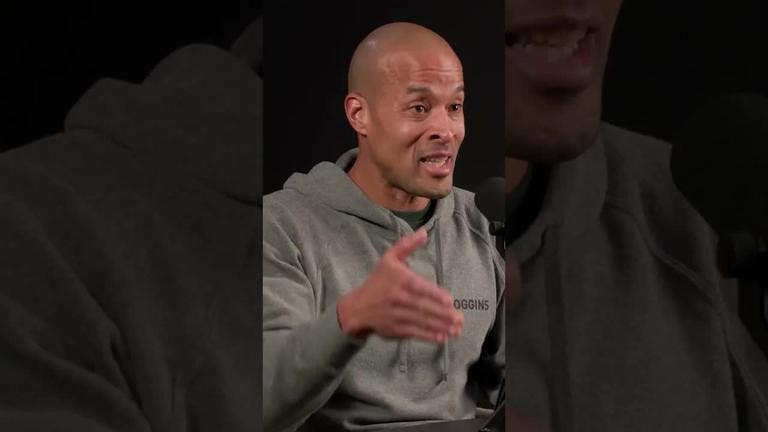
David Goggins on Controlling the Multi-Voice Dialogue in Your Mind
This is an excerpt from the Huberman Lab episode with David Goggins. It’s a brutally direct, mechanistic, and actionable discussion about how to embrace, confront, and control the dialogue in your mind — paying specific attention to the negative voices as a way to transmute all that into successful real-world behavior. Daily. One thing is made cl...
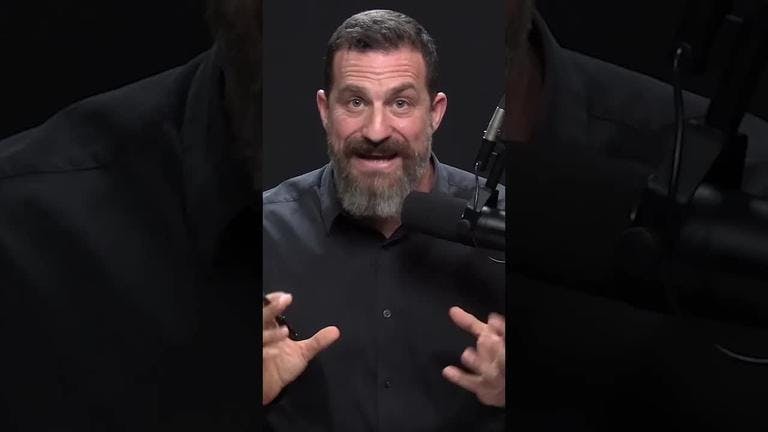
Cold & Flu: When Are You Most Contagious?
Dr. Andrew Huberman shares the science behind contagious periods in colds and flu and the peak times of virus transmission. The Huberman Lab podcast is for general informational purposes only and does not constitute the practice of medicine, nursing or other professional health care services, including the giving of medical advice, and no doctor/p...
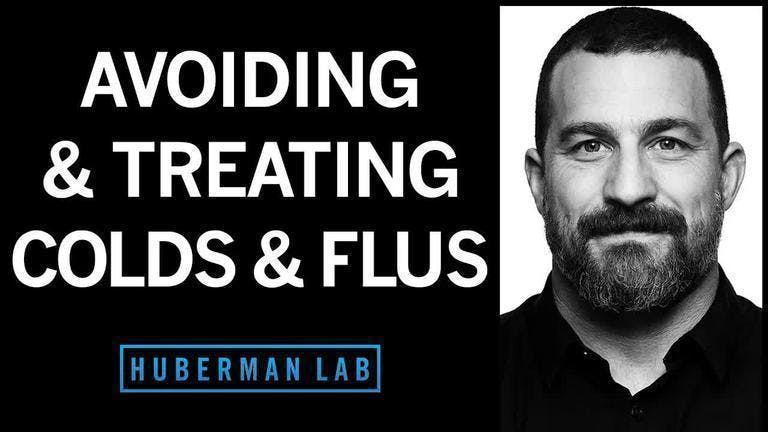
How to Prevent & Treat Colds & Flu
In this episode, I explain the biology of the common cold and flu (influenza) and how the immune system combats these infections. I describe behavior, nutrition and supplementation-based tools supported by peer-reviewed research to enhance immune system function and better combat colds and flu. I also dispel common myths about how the cold and fl...
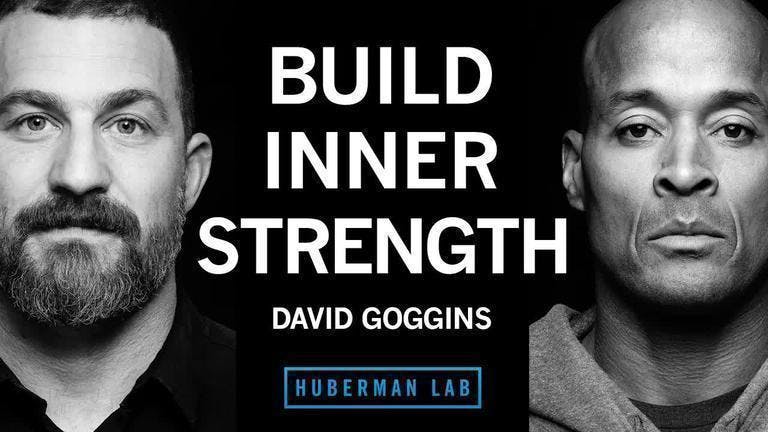
David Goggins: How to Build Immense Inner Strength
In this episode, my guest is David Goggins, retired Navy SEAL, highly accomplished ultramarathoner, best-selling author, and influential public speaker. David explains how he mastered his inner dialogue to build extraordinary levels of discipline and mental and physical toughness. He describes how confronting his early hardships, including physic...
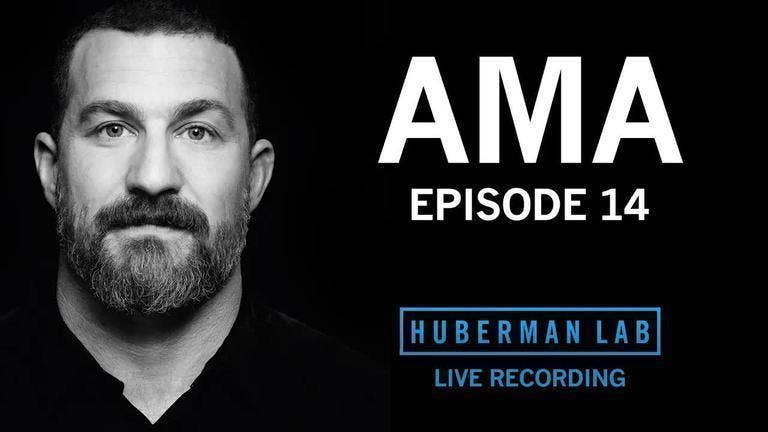
AMA #14: 2023 Philanthropy, Evening Routine, Light Therapy, Health Metrics & More
Welcome to a special edition of the 14th Ask Me Anything (AMA) episode, part of Huberman Lab Premium. This episode is a recording of a live stream AMA, originally exclusive to our Annual and Lifetime Members. We've decided to make the full-length version available to everyone, including non-members of Huberman Lab Premium. Huberman Lab Premium was...
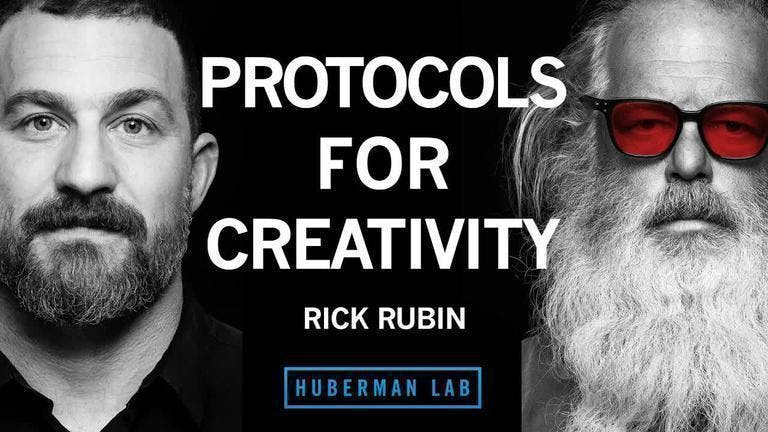
Rick Rubin: Protocols to Access Creative Energy and Process
In this episode, my guest is Rick Rubin, world-renowned music producer of numerous award-winning artists, including Johnny Cash, Red Hot Chili Peppers, Beastie Boys, Adele, Eminem, Slayer, and many more. Rick is also the host of the podcast Tetragrammaton and the author of the best-selling book about the creative process entitled “The Creative Act:...
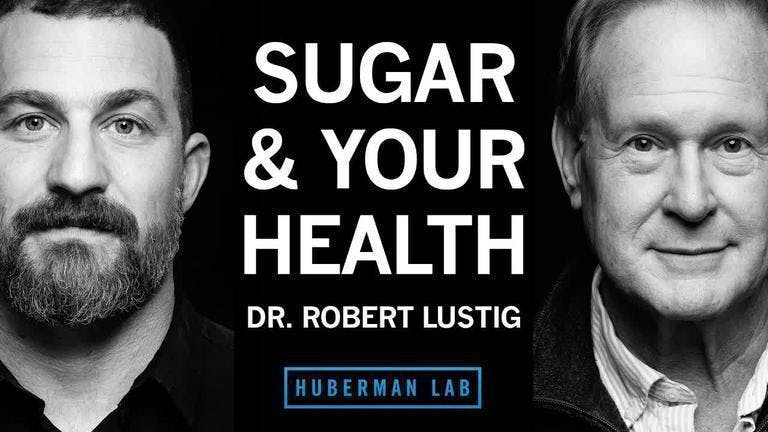
Dr. Robert Lustig: How Sugar & Processed Foods Impact Your Health
In this episode, my guest is Dr. Robert Lustig, M.D., neuroendocrinologist, professor of pediatrics at the University of California, San Francisco (UCSF), and a bestselling author on nutrition and metabolic health. We address the “calories in- calories out” (CICO) model of metabolism and weight regulation and how specific macronutrients (protein, f...

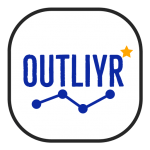
The Best Nootropics Supplements Personalized to Your Brain?
Updated: 01/25/2024
Outliyr is is editorially independent. We may get a small commission if you buy through our links (at no cost to you). Thanks for your support!
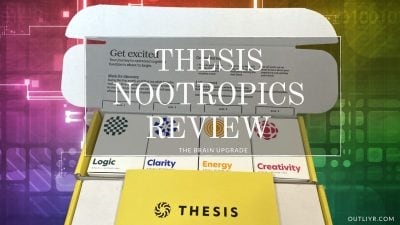
Your brain is a primary difference between winning a Nobel prize and living a life of mediocrity.
How well it functions isn’t solely a matter of genetics.
Neuroscience research, and overwhelming anecdotal experience, show that we can dramatically upgrade our:
- Mental clarity
- Productivity
- Access to the flow state
- Information processing speed
Welcome to the world of “neurohacking”. Using special ingredients and lifestyle practices to optimize the brains and increase our overall quality of life.
But there’s one glaring issue…
Companies making the best brain-boosting supplements recognize this and customize their formulas to your unique lifestyle.
One such nootropic experience is a “newcomer” (you’ll learn why this isn’t exactly true) called Thesis. You take a short brain assessment, they send you a starter kit, and their complimentary coach helps you hone the perfect brain supplements — customized to you!
This post will thoroughly review of TakeThesis, how it compares to other nootropics companies, and whether this is the last brain supplement you’ll need.
In a hurry?
Use the exclusive Thesis code URBAN to save 10%
Quick & Dirty Intro to Nootropics
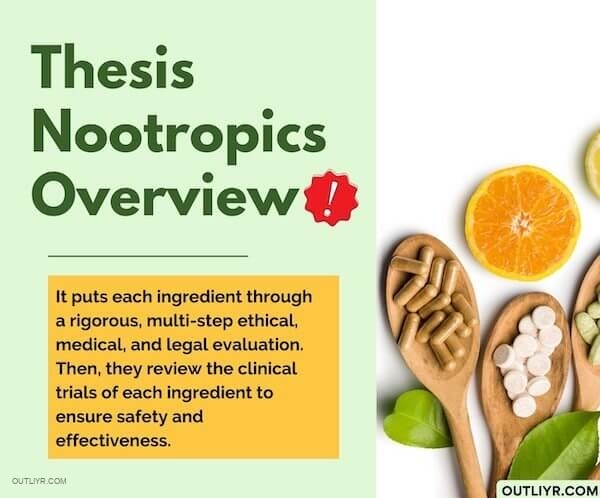
These are different from the off-label use of prescription pharmaceuticals like Adderall.
Essentially, nootropics are a special class of ingredients that satisfy ALL the following criteria:
- Safe and non-toxic
- Enhance learning and memory
- Protect against injury
- Boost natural cognitive ability (memory, logic, creativity, focus, etc)
There’s something that makes them even better…
Nootropics upgrade your baseline performance even after you stop taking them . They cause long-term changes to brain structure and function. Almost like training you how to operate at a higher level and forming positive habits.
At the same time, the good ones provide a quick and noticeable pick-me-up. You don’t wonder if they’re working.
The right formulas help you reach your full potential faster and more effectively.
What is Take Thesis Nootropics?
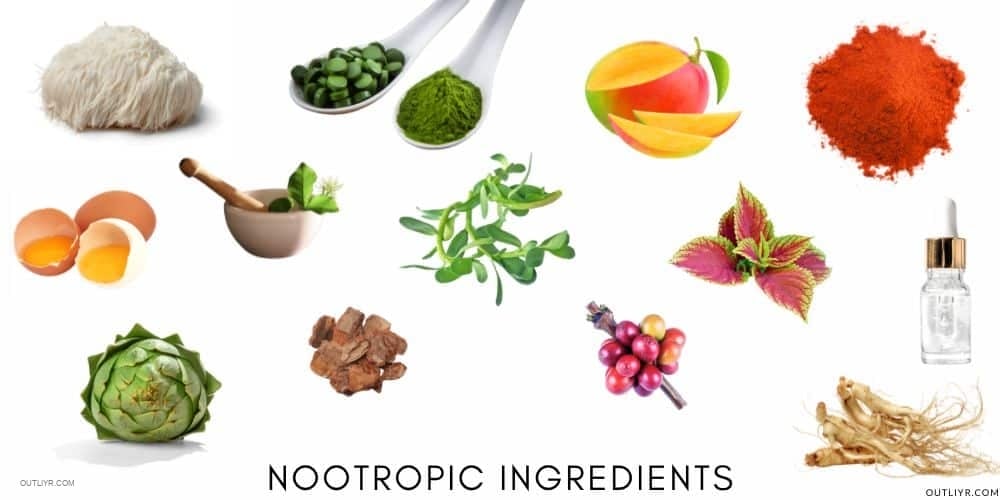
Thesis is the masterpiece of expert brain supplement formulators Dan Freed and Adam Greenfield. This duo began researching nootropics out of personal need. Both struggled with poor cognitive performance. They learned how to balance brain chemistry to maximize performance.
Now they’re sharing their discoveries with the world.
After great success with their original product, Find My Formula (which I reviewed here), they revamped their formulations and process.
While each of us has unique neurochemistries, after working with enough people, they began to spot patterns in which ingredients, the forms of those ingredients, and doses work best. Over the span of years, they’ve amassed a huge dataset:
- 30,000+ users
- 550,000 recommendations made
- 127 ingredients tested
Resulting in 86% of users reporting higher energy levels, better mood, more reliable memory, and greater motivation.
Unsurprisingly, Thesis has garnered a stellar 96% customer satisfaction.
The company also has soul. By donating a portion of each sale to both the Covenant House and The Multidisciplinary Association for Psychedelic Studies (MAPS), they’re evolving the future of brain enhancement and also making it more accessible to the world.
Thesis Nootropics Ingredients
When evaluating any nootropic, you must consider how they source and test ingredients.
The sad truth is that most of the products on the market are WORSE than useless. Contaminated with heavy metals, mycotoxins, pathogens, even adulterated with banned (dangerous) substances.
Thesis puts each ingredient through a rigorous, multi-step ethical, medical, and legal evaluation. Before acquiring and testing the ingredients for safety and purity, every ingredient must be supported as safe and effective by clinical trials.
This team keeps up with the ever-changing regulations.
Since the days of Find My Formula, a lot has changed. Each of their blends has undergone a major overhaul.
One of the common gripes with naturals is that you don’t feel anything.
How Thesis Works
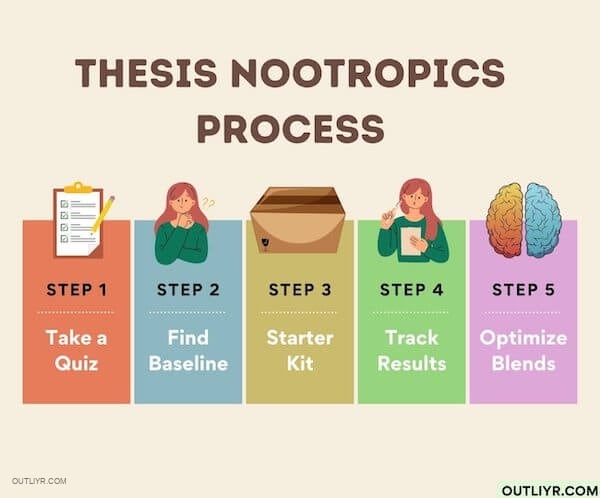
Thesis isn’t your run-of-the-mill supplement company.
They’ve streamlined a process resulting in 86 percent of users finding their neurochemically tuned formulations in less than one month.
This is how to best use Thesis:
- Assess your unique brain
- Establish your baseline
- Begin your Starter Kit
- Notice what works for you and what doesn’t
- Tweak and optimize with complimentary coaching
Your Thesis journey begins with a short survey to understand your basic lifestyle, how your brain functions, and your goals for using nootropics. The entire “quiz” takes just a few minutes. When you finish, their AI finds your “digital twin” to determine which formulations are most likely to work for you.
A few days later, you’ll receive the Thesis Starter Kit in the mail, with the four separate blends best matched to your brain.
I suggest jotting down the way you feel, your challenges, and goals. That way you’ll have something to reference after several weeks of testing. Bonus points for including audio/video in your log.
You’ll follow the directions, testing each product for six days in a row. Then take a break over the weekend, allowing your body to reset. Though you don’t need two days off, I notice better effects when I give my body the extra rest day.
If you’re sensitive, I suggest taking these capsules first thing in the morning.
At any point, you can schedule a call with one of the resident Thesis Nootropics Experts. They’ll help coach you to ensuring the best possible experience and tweak your kit as necessary. Definitely take advantage of the experts, as they’re a key bonus of Thesis !
By the end of the month, you’ll have discovered your favorite blends and the ones that you don’t like. It’s perfectly normal to not like some of them, and your future orders will only include the products you love most.
The Thesis Nootropic Blends for Every Goal
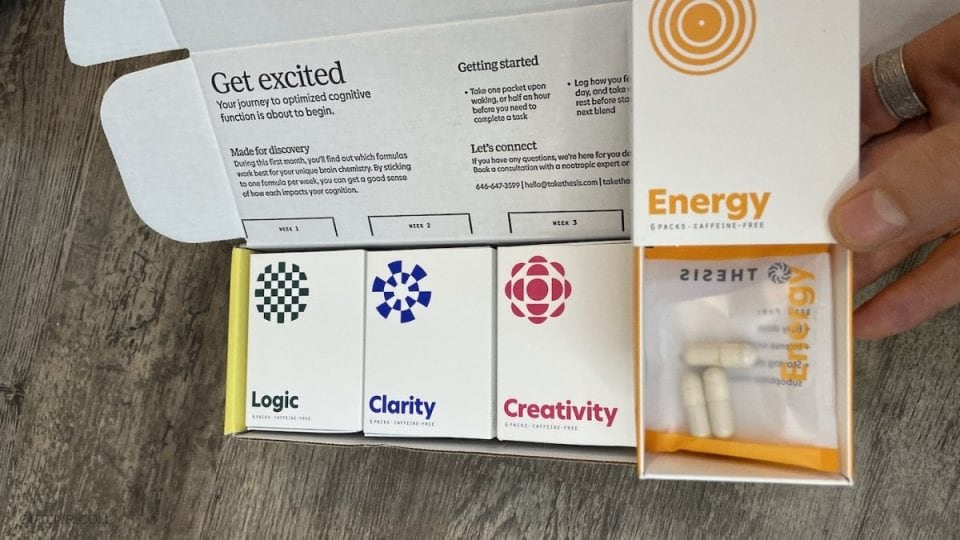
Note that I’ve written about five blends below, but your Starter Kit will only contain four. Once you’ve gone through the Starter Kit, you’ve demoed the blends.
Hopefully, you’ve discovered the ones that work great for you.
For every subsequent order, you get four slots to customize however you prefer. My favorite combo is:
- (2) Clarity
But if I really loved a particular blend, for example, I could just do:
- (4) Creativity
You can request any of the formulations in either of two versions: caffeinated or caffeine-free.
Don’t pay much attention to the names of each. They’re merely general suggestions of the most often reported benefits. It’s entirely possible that you’ll get more clarity from Creativity, or better logical reasoning from Energy.
Let’s examine each of the different blends.

Thesis Energy

I reach for Energy when I get less than 7 hours of sleep, or when I need extra energy to crush a workout and power through a long Monday. It’s also useful for travel days, or when I know I’ll wind up in energy-depleting situations. Others use it to reinforce new healthy habits.
Thesis Energy blend ingredients include:
- Zynamite® – 300mg
- TeaCrine® – 100mg
- Sabroxy® – 100mg
- CDP Choline – 300mg
- N-Acetyl-L-Tyrosine – 300mg
- N-Acetyl Cysteine – 500mg
- Optional: Caffeine – 100mg
- Optional: L-Theanine – 200mg
Sabroxy is an ancient Ayurvedic extract that comes from the bark of the Indian trumpet tree. Research suggests it enhances memory, focus, immunomodulation, mood, and even skin health.
From previous experience, I know that I respond well to Zynamite and TeaCrine. The former is an extract of mango leaf, and the latter is a molecular cousin of caffeine that comes from a tea plant, is non-habit forming, and with fewer side effects. Both noticeably increase energy, as expected. As a bonus, I find that these two also lift my mood.
Compared to the previous Energy formula, this iteration is smoother and more refined. Each sachet contains three capsules, and I start feeling effects 15 minutes after swallowing them.
I’ve been a big fan of all the Energy blends I’ve tested so far. It’s constantly ranked in my top 2 favorites due to the pronounced effects. It feels like a more full-body caffeine without the jitters or crash.
Thesis Clarity
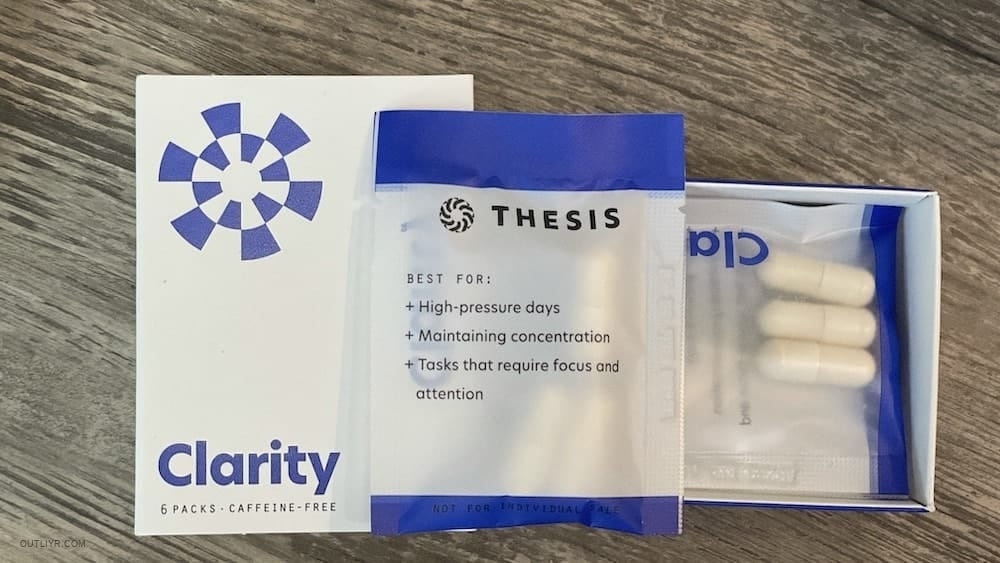
As the package insert describes, Clarity supports a calm, focused flow and is great for optimal performance during high-stakes days. Good for presentations, content creation, and non-stimulating concentration.
I’ve found this description to be spot on. The formula has undergone a complete overhaul, featuring two ingredients I haven’t found in other nootropics.
Thesis Clarity blend ingredients include:
- 7,8 Dihydroxyflavone – 30mg
- Camellia Sinesis Extract – 250mg
- Alpha GPC – 250mg
- Epicatechin – 250mg
- Lion’s Mane 8:1 Extract – 500mg
7, 8 Dihydroxyflavone is a man-made flavonoid that can penetrate the blood-brain barrier and mimic the effects of BDNF (dubbed “MiracleGro for the brain”). Camellia Sinesis is the ingredient that earned tea’s reputation as a health drink. It’s a potent source of the relaxing compound l-Theanine. Epicatechin also comes from tea, and it promotes optimal blood flow, mood, and neuroprotection.
A dose of Clarity takes three capsules, and I couldn’t pinpoint the exact time I started feeling it. The effects became more pronounced after approximately one hour.
Don’t expect a huge boost in energy or racing thoughts from this one. Once I released that expectation, I noticed that I felt clear, calm yet alert, steady, and mentally sharp . All without overstimulation. I flowed through my work, easily focusing on each task through completion.
To my surprise, Clarity went from among my least favorite Find My Formula blends, to my Thesis top pick.
I’m confident that this is one of the only nootropics that I can take in the afternoon (or even evening) and still sleep great.
Thesis Creativity
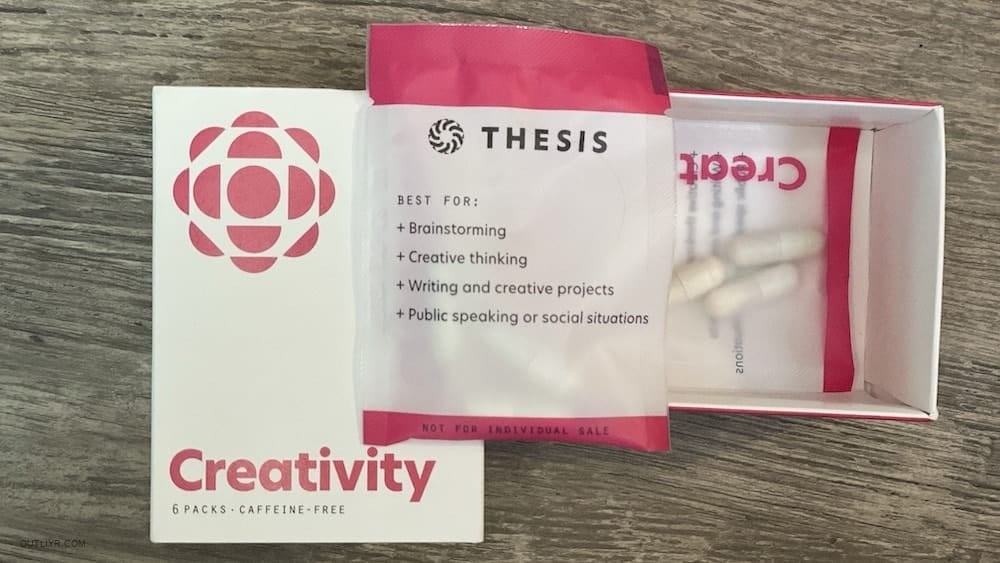
Creativity helps you generate new ideas, think abstractly, and finally bring your dream projects to fruition. It works by quieting overthinking and helping integrate both hemispheres of the brain.
The stack of powerful adaptogenic herbs also makes it an excellent choice for stressful situations, or to relax in social events.
You can rest assured that it contains some of the most researched and scientifically proven herbs on the planet. Ashwagandha and Panax Ginseng are staples in Ayurvedic (Indian) and Traditional Chinese Medicine. Thousands of studies back their use.
Thesis Creativity blend ingredients include:
- KSM-66 Ashwagandha – 300mg
- GS15-4 Panax Ginseng – 200mg
- Zembrin® – 25mg
- Agmatine Sulfate – 250mg
- Alpha GPC – 150mg
The Thesis formulators did a great job here, handpicking the strongest, cleanest, and most bioavailable forms of each ingredient.
Zembrin is one I hadn’t heard of, but am impressed by what I’ve learned. It’s a plant extract known to boost mood, improve workout focus, alleviate nervousness, and enhance complex problem-solving.
Approximately 45 minutes after my three-capsule dose, I noticed myself feeling slightly less reactive to urgent emails and other daily stressors. I could also more easily discern wisdom from my intuition. Each time I followed my instinct, I made the right choice.
I do already regularly take Ashwagandha and Ginseng in my own supplement regimen (which I stopped for this experiment), so it’s likely that my reaction is milder than most.
Thesis Logic
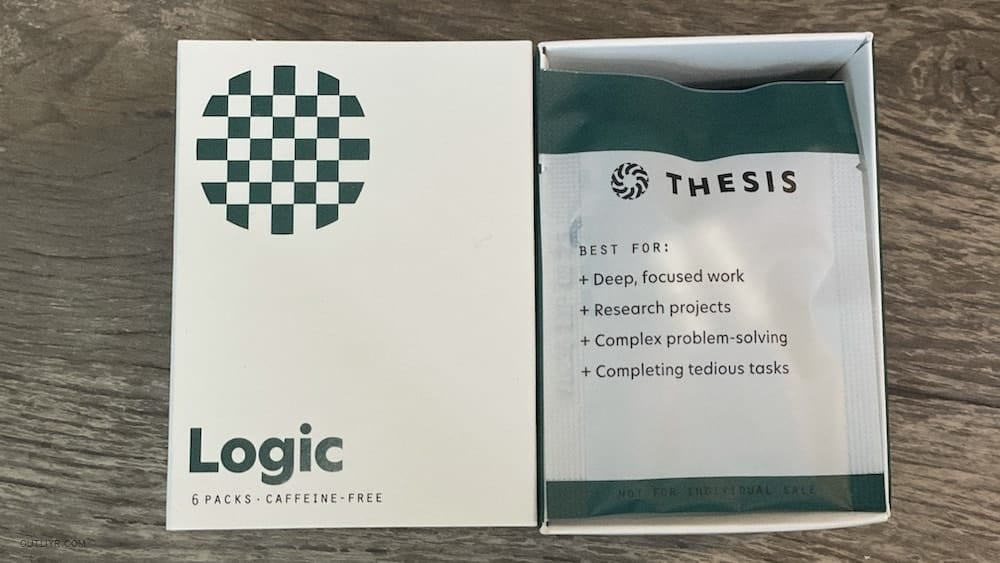
The name summarizes it well. Logic supports rational thinking. Making a popular choice among lawyers, bankers, programmers, scientists, academics, and those looking to boost their analytical abilities.
Though I didn’t get it selected for my Starter Kit, I reached out to their customer service to have it swapped in. As a Data Scientist, I knew that this would fit me well.
I was right. My first experience with the original Find My Formula Logic blend quickly took silver (only behind their original Energy). It hit the sweet spot between energetic stimulation and effortless focus. I went from spec sheet to finished product 35 percent faster than normal.
Thesis Logic blend ingredients include:
- Triacetyluridine – 30mg
- Vegan Omega-3 Lysine complex (EPA + DHA) – 200mg
- Phosphatidylserine – 200mg
- Theobromine – 100mg
- Gingko Biloba – 160mg
- Synapsa® (Bacopa monnieri extract) – 320mg
As its name suggests, Triacetyluridine is a more potent version of the nootropic uridine. It’s known to improve learning, memory, energy, mood, and reduce neuroinflammation.
Theobromine is a mild stimulant related to caffeine naturally occurring in cacao. It increases blood flow, and improves focus.
Those interested in memory enhancement may know Bacopa — one of the greatest ancient memory-enhancing herbs. Gingko is another notable natural herb, known to improve alertness, concentration, focus, and memory.
Phosphatidylserine comes from sunflowers. It gently alleviates stress without drowsiness, improves memory, and increases alertness.
Indeed, the Logic formulation improves working memory, offsets stress, and accelerates learning. On days I reluctantly approached tedious work, the two capsule dose of Logic took the edge off within about 20 minutes.
I’m still experimenting with the latest Logic blend, but so far it stacks up with the original. The new Logic feels slightly weaker, but I greatly prefer the new ingredients.
Thesis Motivation
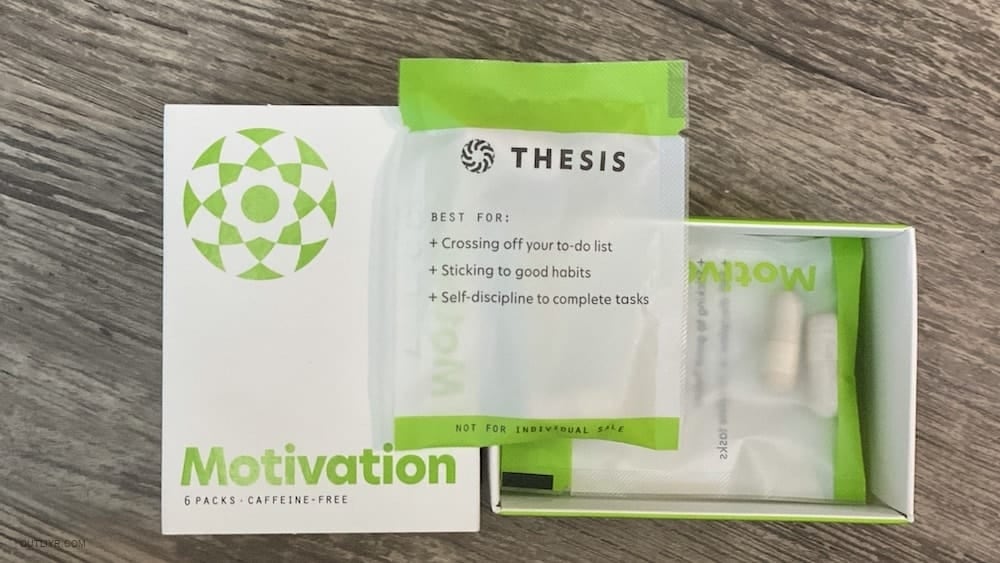
Motivation comes in a lime-green sachet. It’s Thesis’ take on the classic and original CILTEP nootropic stack.
Motivation bills itself as best for:
- Crushing your TODO list
- Building healthy habits
- Increasing discipline and drive
It’s one of the blends that’s most polarizing. You either love it, or you hate it.
I’ve tested this exact formulation produced by several different companies (including NaturalStacks and Find My Formula), and I’ve had bad experiences every single time.
The predominant effect I notice is a headache (which I never get). I also feel slightly spacey. This time I came prepared and used Semax to pull me out of my CILTEP fog.
But just as many people rave about their Motivation.
Thesis Motivation blend ingredients include:
- Forskolin – 250mg
- Methylcobalamin – 1000mcg
- Dynamine – 100mg
- L-Phenylalanine – 500mg
- Artichoke Extract – 450mg
It’s safe to say that after two days of use, you’ll know which Motivation camp you fall into.
Thesis Confidence
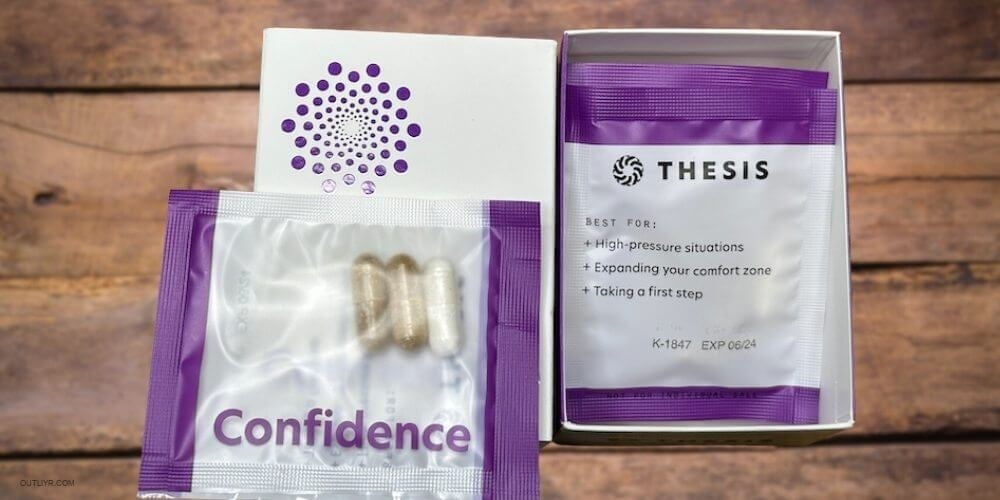
Confidence is a newer Thesis blend that came out in mid-2022 after heavy internal research and development. I’ve been using it for the last few weeks and it’s certainly one of my favorites. Perhaps my top non-stimulating Thesis Formula.
Typical use cases for Confidence include:
- Important situations
- Doing uncomfortable or new things
- Times of leadership
- Stopping overwhelm
My experience with Thesis Confidence has been overwhelmingly positive. Within about 30 minutes, I felt a smooth and definite mood boost. The day seemed to flow easily. I didn’t feel jitters or nervousness before overwise stressful no-agenda meetings.
This one is great for social situations. I’m noticing that I feel more comfortable and bold as a newbie Bachata dancer.
Although it’s not very stimulating, I noticed a slight rush kind of like the effect of finishing a good workout. Increased blood flow and slight flushing paired with relaxation (but certainly not any sedation).
Thesis Confidence blend ingredients include:
- Saffron extract (affron®) – 28mg
- Ashwagandha extract (Shoden®) – 120mg
- Sage extract – 333mg
- Magnesium threonate – 50mg
- Magnolia bark extract (DHH-B) – 10mg
This is an excellent formula. I love the synergy between the ingredients. Plus, many of these (like Saffron) are expensive and commonly faked in supplements. By using the patented versions, we’re assuredly getting the real thing.
How to Use Thesis
When the shipment finally arrives in the mail, you might feel overwhelmed.
Here’s what to expect…
Inside the large box, you’ll find four smaller boxes. Each box contains five sachets. Monday through Saturday mornings, you take one full sachet (2-3 capsules).
I suggest you take notes beforehand on what you wish to get out of the experience. Some popular examples include:
- Spending less time distracted on social media
- Output at your main job
- Progress toward hobbies, projects, or other work
- Starting a new skill, language, or health habit
- Finish work faster
Then, at the end of each day, spend 15-seconds jotting down notes in the provided instruction manual. Trust me, this makes a huge difference. After completing week four, you’ll probably forget which blends you loved, the effects they had, and which ones didn’t work for you.
Some of the ingredients last slightly longer in your system, so I take the entire weekend off to allow my neurochemistry to reset. This also ensures you get the most bang for your buck.
After repeating this process for all four boxes, you’ll have discovered your favorite blends. A Thesis coach can help you customize future orders so you’ll only receive the ones you want!
Tips to Get the Most Out of Thesis Nootropics
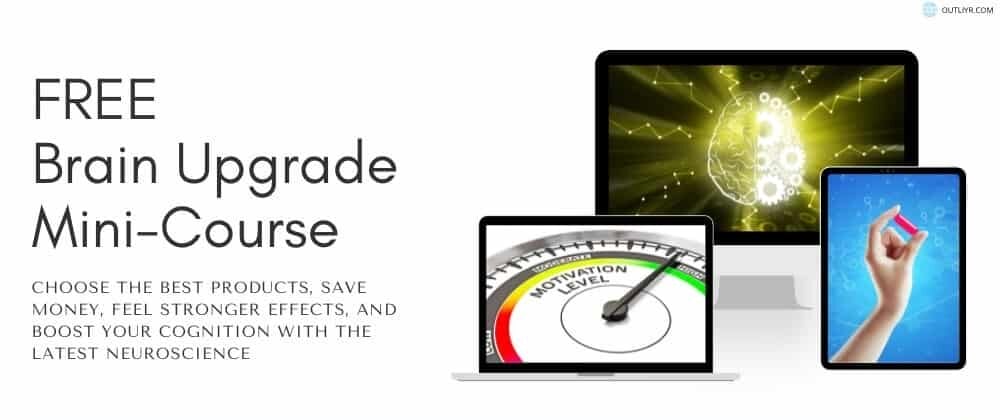
Nootropics aren’t cheap.
You can skip this entire section, but these tips will help ensure that you get the most out of your experience.
Caffeine-free . If you’re new to nootropics, start with the non-caffeinated versions. I drink coffee most days. Sometimes two cups. But I always get my nootropics caffeine-free. For several reasons. First, nootropics potentiate caffeine. One coffee can feel like 3. If you’re not used to the combo, going caff-free gives you more control. Caff-free also means that I can take nootropics later in the day. Also, the health benefits of coffee don’t come from caffeine but from the polyphenols, flavonoids, and other phytochemicals. Plus, I just like the taste of coffee.
If you like this kind of thing, join my FREE nootropics mini-course where you’ll learn:
- How professionals choose products
- Tips to feel stronger effects and get more out of your supplements
- Money-saving hacks
- Natural cognitive enhancement technologies
- Latest neuroscience-backed strategies to upgrade your brain
Fill out the info below to get started…
Request received. Your invitation should arrive in your inbox within about 5 minutes.
Thesis Nootropics Questions & Answers
Should i take thesis with caffeine.
I recommend taking Thesis without caffeine to start. Caffeine greatly increases the effects of certain nootropics. For some, this can be too much and lead to panic, headaches, and unease. You can always add coffee and more easily control your caffeine dosage later.
What’s the difference between Thesis and Find My Formula nootropics?
Thesis is the latest generation of Find My Formula nootropics. They’ve refined, upgraded, and revamped every single one of their formulas according to the latest neuroscience research. Find My Formula products are no longer available.
Which Thesis blend is best?
Your ideal Thesis stack depends on your neurochemistry, lifestyle, and goals. People either love or hate their Motivation blend. My favorites (in order) are Clarity, Energy, and then Logic.
How much do Thesis nootropics cost?
Thesis offers two different buying options: one-time, and subscription. One-time purchases cost $119.00 and subscriptions cost $79.00 per month. Use code URBAN and save an extra 15 percent! Thesis backs all purchases with a full 30-day no-questions-asked money-back guarantee.
Thesis Nootropics Review: Boosting Your Brain With Precision Formulas
Ignore those that say you’re stuck with a less-than-optimal brain.
According to the latest neuroscience (and countless personal examples), that’s demonstrably false.
That is if you use the right products.
The most popular nootropics today are:
I’m constantly trying the latest nootropic formulas.
I take most of them for a month and see little benefit.
Thesis is one exception, featuring an impressive array of the highest-quality forms of well-researched ingredients. Drawing from their millions of data points, they’ve come up with unique formulas that give you both a quick boost and long-term benefits .
So that one day, should you choose, you can completely stop supplementing and continue enjoying all the fruits of an upgraded brain.
I personally prefer their Clarity, Energy, and Logic. Each serves a role specific to the type of day I have ahead.
Since the original Find My Formula blends, I’m impressed with their improvements. They’ve moved away from some of the man-made ingredients and embraced natural (but effective) bioharmonizing compounds.
As of January 2022, Thesis has amassed a 4.5+ star rating on 7,411 ratings.
Try it yourself with the exclusive Outliyr discount:
Thesis nootropics code URBAN saves you 10%
To the long-term Formula users — what do you think of the update? Have you enjoyed the new Thesis blends?
Let’s have a discussion in the comments below!
Post Tags: Brain & Cognition , Lifestyle , Nootropics , Review , Supplements
12 thoughts on “The Best Nootropics Supplements Personalized to Your Brain?”
Unfortunately, I can not use any of the samples sent by Thesis. Each packet contained the caffeine equal to a cup of coffee.
What a bummer!
I’m not sure how you do with caffeine, but it also includes l-theanine which is a natural amino acid that really smoothes out the negative effects of caffeine (I won’t use any form of caffeine without it). You might want to reach out to their team about this, but last I heard, one of the pills in each sachet is exclusively caffeine/theanine. I’ve received a few caffeinated boxes, and just threw away the smallest white caffeine/theanine pill.
Or you can reach out to them and they will likely make it right.
Hey, I had the same issue. Fortunately, the caffeine portion comes in its own separate capsule (the white capsule in each packet), so you can choose to leave it out!
Correct. It’s the smaller white one if there are multiple white capsules.
I’ll be honest. I think this is a scam, like snake oil.
Hi Andrew. Not sure what you mean. Have you ever used nootropics? Or botanicals/herbals? What makes you think this is a scam?
This is my first time visiting the website although I’m no stranger to nootropics. I don’t remember where or how I discovered acetyl choline—AGP?—but it was a game changer for me. I’d been taking phosphatidylserine for memory enhancement for at least 2 decades, L-Tyrosine to boost dopamine, PEA, for the same reason. All on my own initiative, as a result of my own independent research. What disturbs me about Thesis is: 1). I suffer from a congenital disease for which there is no cure—Lipedema—and this is allegedly at the root of the fatigue which has blighted my entire life and which I have been attempting to overcome for most of it. The disease afflicts about 10% of women and as one doctor blithely informed me, “you;d be better off with cancer. At least there’s a chance you might recover.” As a result of the quiz I took, Thesis informed me I was in the bottom 4% of applicants and never investigated further. Well, Hello. 2). Quiz had questions about exercise but nothing about diet or meditation, Since I follow functional and integrative Medicine, these gaps disappointed me. I still haven’t made up my mind about becoming a member, but I am grateful to Andrew Huberman for drawing my attention to this range of products.
Hi Jacqueline, sorry about the super slow response here! Glad you’ve found things that work for you. That’s strange. When I took the quiz, they didn’t show percentiles. I agree, diet and meditation are essential. Impossible to overlook really, especially when we’re discussing nutraceuticals. I’ll let them know when I talk to them next.
Update on “the ingredients are not evenly distributed throughout the pills.” I spoke to a Thesis rep this week, and after a detailed conversation regarding the caffeine pills (the small white pill in each caffeine line of products), she clarified that the other pills (not the 100mg of caffeine + 200 mg of L-Theanine small white pill) have the remaining blend evenly distributed between the pills.
Loved your article, how you spelt it out, and agree strongly with the feelings on Clarity being “clear, calm yet alert, steady, and mentally sharp. All without overstimulation.”
Good correction! The caffeine/theanine pill is easy enough to spot.
Thanks for the feedback. Which are your favorite(s)?
Nick, this is an awesome intro to nootropics and Thesis, thank you for breaking this down! I was a Formula customer for years and my favorite blends were Clarity and Creativity. With the new Thesis formulations Energy has been added into my routine! I feel like I have tools at my disposal for any occasion… Creativity is great for social situations or other experiences that would otherwise leave me mentally fatigued, Clarity is great when I have a ton I want to accomplish without interruption, Energy is great when I haven’t had great sleep or need to do more physical stuff. I don’t use it every day, but it’s there when I need a lift. Great read, thanks for the knowledge!
Thanks! How often do you use Thesis? Do you combine it with anything else?
Leave a Comment Cancel reply
Nick Urban is the Founder of Outliyr, an expert Biohacker with 12+ years of experience, a Data Scientist, a Certified CHEK Practitioner, Host of the Mind Body Peak Performance Podcast, and a High-Performance Coach. Click here to read how Nick went from struggling pre-diabetic, to collegiate rugby national champion. To send Nick a message, visit his Contact Page .
Diet & Nutrition
Ingredients and compounds
Mind & Cognition
Movement & Fitness
Tools & Gears & Services
Common Tags
- Alternative Medicine
- Alternatives
- Ancestral Health
- Bioelectric
- Biohacking Cities
- Bioharmonizing
- Blood Sugar
- Blood Testing
- Brain & Cognition
- Cardiovascular Health
- Consumables
- Controversial
- Digital Drugs
- Digital Product
- Electrical & Quantum
- Electrolytes
- Environment
- Essential Oils
- Extreme Temperatures
- Fitness Product
- Food Intolerances & Allergies
- Foundational Health
- Functional & Holistic Health
- Grocery Shopping
- Holidays & Vacation
- Inflammation
- Mitochondria
- Nervous System
- Oral Health
- Performance
- Product Roundup
- Quantification
- Recommendations
- Recovery & Resilience
- Relationships
- Routines & Rituals
- Spirituality
- Strength & Muscle
- Supplements
- Toxins & Toxicants
- Trace Minerals
- Vitamins & Minerals
- Weight Loss
Who is Nick Urban
Every year I spend over 1,000 hours reading, discovering, testing, and analyzing strategies
Nick Urban is the Founder of Outliyr, an expert Biohacker of 10+ years, Data Scientist, Certified CHEK Practitioner, Host of the Mind Body Peak Performance Podcast , and a High-Performance Coach. Click here to read how Nick went from struggling pre-diabetic, to collegiate rugby national champion. If you want to send Nick a quick message, then visit his Contact Page .
Zoom with Nick Urban
BiOptimizers Breakthroughs
An entire catalog of best-in-class formulas produced by the world's highest-rated supplement brand. As mentioned in my full BiOptimizers review , I use their products daily. Code URBAN saves 10%
Sens.ai Brain Training
Like building your ideal body in the gym, we can also train our minds to work better and more efficiently. I use this 5-in-1 system daily. Read my review and use code URBAN to save 5%
Nootopia Brain Breakthrough
Instantly unlock your brain's full potential with powerful elixirs customized to your unique neurochemistry. Read my review and use code URBAN to save 10%
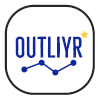
Coaching Login
Biohacker's Shop
Mind Body Peak Podcast
Urban Supplement Stack
Biohacking Resources
1500 E Riverside Dr, Austin TX
530-426-2319
©2024 Outliyr LLC
Privacy Policy | Terms Of Service | Editorial Policy | Disclaimers
- Newsletters
- Account Activating this button will toggle the display of additional content Account Sign out
So, Should You Trust Andrew Huberman?
The wildly popular podcaster and scientist claims he can help you live a healthier life. but we should think of him as a dr. oz type..
We live in a world of misinformation and fearmongering. Headlines bombard us with claims about cancer, chronic illness, the dangers of our food, “toxins.” Health anxiety seems to be at an all-time high.
Enter Andrew Huberman. He has a Ph.D. in neuroscience, with research expertise in optic nerve signaling. His wildly popular podcast claims to make science more understandable while giving you simple, “zero-cost” protocols for your health. The appeal Huberman offers is obvious: control over our health when it feels like we have none.
In reality, his podcast is focused on pseudoscience: He often makes claims that appear scientific but lack evidence, plausibility, and validity. Pseudoscience presents unsubstantiated conclusions, but it can be incredibly hard to distinguish from conclusive evidence. It contains grains of truth, but those grains of truth are exaggerated beyond the point of usefulness, even so far as to lead away from the truth. Huberman fills his podcast with confident displays of pseudoscience, topped with the appeal to authority he garners by regularly repeating his academic credentials to gain your trust.
The March 25 New York magazine cover story laid out a stunning tale about Huberman—that he was seeing six women simultaneously. Further, that story says, his lab at Stanford, “according to knowledgeable sources, barely exists.” Whether or not you care about infidelity and hosts’ personal lives, listeners to Huberman’s podcast should not sweep aside the contents of the New York mag story as mere gossip. As a biomedical scientist who has spent a lot of time considering what Huberman has to say, I can tell you that he is leading his podcast audience astray, too.
If you’re not a fan of his work, let me give you an indication of what his show is like. His episodes are exceedingly long, often over 2 hours. He fills them with scientific-sounding jargon, stringing together names of genes or proteins that a listener might hear and think, “Hey, he is using complex lingo, he must really know his stuff.” But jargon gives the illusion that Huberman intimately understands topics he doesn’t. (Scientists, for all their knowledge, are trained to know a lot about a relatively narrow field.) He inserts widely held generalizations—sleep is important, exercise is beneficial, and lifestyle can impact our health—to add legitimacy. If you agree with some of his statements, then why not everything?
Huberman frequently supports his assertions by saying things like “supported by peer-reviewed research,” or “science-backed,” and he includes links to papers in show notes. But it’s important to know that not all studies are created equal. Some studies are done on cells in a Petri dish ( in vitro ), or on animals ( in vivo ). In others, scientists ask people to fill out surveys recalling details from their days or weeks, or they observe human participants’ behavior in a lab. Neither of these methods creates particularly reliable results for humans. Other studies are controlled clinical research—like studies where some people receive a treatment, others a placebo. That is the kind of research you want to see before undertaking a health intervention. But even there, study design matters. It dictates how strong the data can be, and how much you can conclude.
Think about yourself, and then think about a layer of cells growing on a piece of plastic. There’s a big difference. Things that happen to cells in a plastic dish—say, when you add an ingredient found in a dietary supplement to them—aren’t representative of what will happen to a person consuming those supplements. We have to consider the physiological relevance and limitations of a study when we analyze the data (findings which are often used by scientists to determine further avenues of exploration, or to add, piecemeal, to the picture of how biology works).
Huberman often doesn’t do that. Instead, he extrapolates non-human data to people, using in vitro studies, or in vivo studies on non-human animals, to make prescriptive recommendations for lifestyle changes. He cherry-picks weak or irrelevant studies while discarding larger and more robust studies that demonstrate something different. If you’re not conducting research or regularly dissecting scientific studies, this might not be obvious. But to scientists, it is.
Take an episode on how cortisol and adrenaline can boost energy and immune function . He calls sleep “the ultimate reset” for the body following a stressful day (who can disagree?). Then, he goes on to tout ashwagandha supplements as basically a miracle panacea for stress. According to him, it “has a profound effect on anxiety,” and can reduce stress, cortisol, and even depression. He goes further, extrapolating cellular mechanisms to suggest ashwagandha may trigger a range of downstream effects, improving vision, cardiovascular health, sleep, and memory. These are a lot of bold claims.
Upon my own literature review, I found in vitro studies using rat neurons , rat studies that included behavior assessment, and some other in vitro studies . Human data provides a conflicting and more limited picture: A 2012 study that suggested it can improve chronic stress had just 64 participants. A meta-analysis, pooling data from five small randomized controlled trials , found that it might help with sleep, particularly in people with insomnia, but found “no significant effect on quality of life.” Another noted the supplement “significantly reduced anxiety,” which refers to statistical significance, not clinical relevance. If you look at the data, the sample sizes are small and outcomes rely on self-reported symptoms. The overall assessment concluded that there is weak confidence in the link to ashwagandha, which warrants “further high-quality studies.” I wouldn’t suggest anyone bank their health on this stuff. It also has documented evidence of harm . But Huberman tells his listeners that ashwagandha “comes through as the heavy hitter,” alongside a liability caveat: “You’re responsible for making sure [supplements are] safe for you if you decide to use them.”
In another episode, there was an error so obvious that it would have been comical if it hadn’t been so misleading. Huberman was joined by Robert Lustig, a pediatric endocrinologist with a history of making hyperbolic claims about nutrition, like calling sugar a “poison.” Lustig references a study to claim ultraprocessed food consumption inhibits bone growth. Huberman asks, “Was this in vitro or in vivo?,” to which Lustig replies, “In vivo.” Huberman exclaims: “So these are people that are eating high amounts of highly processed food; exactly how did [the researcher] find those in the Middle East?” Lustig answered: “In Israel.”
While “in vivo” can technically refer to a study done in people—we are animals— the study Lustig was referring to was actually in rats. To claim that the results have a direct relevance to people is a wild misinterpretation of data. (And the truth around ultraprocessed foods is complex .) But Huberman presents his conclusions as if they are facts, and so his listeners trust him.
Huberman also uses false balance: the fallacy that equal and opposite sides always exist. Take his thoughts on fluoride . While fluoride has been used for decades to prevent dental disease , Huberman gives the impression that there is an ongoing debate among experts about its use, and reasons for his listeners to be careful of how much fluoride-containing tap water they consume . During his oral health podcast episode, Huberman undermines consensus data on fluoride, endorses fluoride-free toothpastes as well as a yerba mat é tea company that uses fluoride-free water ( and which he is a business partner of ), and cites a dentist who spreads fear about fluoride as his expert reference. Huberman positions this for his listeners as “information to make the best decision,” as though we all need to be carefully thinking about our fluoride levels.
An episode he did on colds and flu was so littered with falsehoods that I dissected it in a four-part newsletter on my Substack, ImmunoLogic. He advertised the episode as “science-backed” methods to prevent colds and the flu, but he announced he does not get the flu vaccine, the No. 1 thing that prevents flu . A scientist waving aside the most science-backed measure to prevent the flu is not providing credible advice. Huberman claimed that the flu vaccine can be “completely ineffective” if it does not protect against the strain of flu circulating that year, noting that he often does not get the shot himself. Here’s how those vaccines actually work, though: Flu vaccines include four different flu strains: two influenza A and two influenza B viruses, which are selected from flu virus surveillance. While there are more possible flu virus strains, vaccination still provides broad protection against illness, hospitalization, and death from any flu viruses because of the polyclonal memory immunity we generate . Even if you get infected with a different strain of the flu, if you’ve been vaccinated, it will make illness easier to weather than it would have been otherwise.
From basic Immunology 101 to how vaccines work, virology, and the public health impact of influenza, that episode was littered with falsehoods. He even—in that same episode—botched the relationship between exercise, cortisol, and immune function , and said antibodies are produced by stem cells in bone marrow. They are actually produced by B cells in our lymphoid organs, a fact which is fundamental to immunology. (He publicly replied in an Instagram comment that he consulted three MDs for the podcast episode , which is not actually that relevant; doctors know a lot—but they’re not inherently experts in immunology.)
This brings us to the conflicts of interest: his sponsors. Having a paid sponsor isn’t a disqualifier in and of itself. But when your financial conflicts of interest seem to dictate your content, it should be. After dismissing legitimate data in the flu episode, his lengthy “science-backed” discussion to prevent colds and the flu boiled down to an extended commercial for taking supplements. Huberman is sponsored by Athletic Greens, which sells a supplement powder called AG1, which promises to “support immunity” and “promote gut health.” One easily gets the idea listening to Huberman that taking supplements of all sorts is very, very beneficial to your health.
But steering your listeners into the wide and unregulated world of supplements is bad. At best, most supplements do nothing. At worst, they can be harmful, potentially fatal . Supplements, thanks to a fun legal loophole, can be sold without the burden of safety and efficacy data that Food and Drug Administration–approved medications must generate. Aside from certain instances where a specific supplement would be recommended by a doctor for a medical issue, there is no body of evidence to support supplements. No credible scientist should repeatedly tell you to buy and consume a special supplement drink, just in case.
The problem with health misinformation is that it often misleads people to do things that are ineffective or potentially harmful—while discouraging them from evidence-based interventions. Those who believe in one piece of health misinformation are more likely to believe others. There is a direct relationship between wellness behaviors like buying supplements and believing medical conspiracies. Though, yes, Huberman actively promotes medical conspiracies too. On the episode with Lustig, he suggests that 93 percent of Americans are “inflamed” and have leaky gut, a pseudoscience diagnosis promoted by the wellness industry. ( I have discussed the issues with that here .) His endorsement will only propagate that misinformation.
Biology is complex, and we don’t have every answer to everything. Issues with our health care system compound the frustration, and even desperation. But wellness products aren’t a solution: They are an exploitation. Wellness influencers like Huberman pit their solutions against conventional science and medicine to sell unproven interventions that are expensive, have no benefit, can lead you to delay real medical treatment, or be actively harmful.
As a scientist and science communicator, it saddens me. Huberman could be improving health outcomes, science literacy, and critical thinking, but instead, he chased fame and wellness fortune, à la Mehmet Oz. The $5.6 trillion global market of wellness persuaded Huberman to contribute to misinformation, not combat it.
Huberman has a massive following and influence. He doesn’t use the responsibility as someone trained in science to be accurate and reliable. Instead, he promotes pseudoscience while eroding public trust in legitimate science and robust scientific agencies.
There isn’t an easy fix. We must shift the paradigm. Too many people confuse celebrity with expertise. Rebuilding trust and science literacy will be an ongoing effort, especially when falsehoods spread faster than facts. Further, we need people to understand that scientific expertise doesn’t transfer to every field. If someone presents themselves asan expert in too broad a topic range or topics outside their expertise, be wary. We need good scientists and medical professionals sharing robust data, and we need resources to do that, and for those with platforms and influence to elevate it. In the meantime, listeners should be wary of anyone rocketing up the podcast charts by sharing easy, simple fixes.
- Build Your Own Box
- Ingredients
blends tailored to your unique needs.
- Shop Blends
- Refer a Friend, Get $25
- Boost your willpower to beat procrastination
- Convenient daily-dose packets for a month's supply of nootropics
- Feel the effects within 60 minutes
- Sustains energy and focus to tackle your to-do list
- 3rd party lab tested for purity and potency
24 daily doses delivered monthly
Select preference:
- Caffeine free
Subscribe & Save $40 Skip or Cancel Anytime.
One Time Purchase
Monthly Delivery Billed monthly
$79/Mo 34% off
Ships in 1-2 business days
- Take one packet in the morning on days you need to perform your best and remain calm, even in stressful conditions.
- Take one packet 30 minutes before starting a task that requires elevated focus.
The effects vary based on genetics and experience. It can take as little as 30 minutes to feel the impact, but some may need a few days of consecutive use.
Taking on an empty stomach with glass of water after waking up is most effective.
Trusted by experts
Dr. gabrielle lyon.
Functional Medicine & Nutritional Sciences
“I work with CEOs, celebrities, and other top performers in my practice. Thesis is what I recommend and take personally for focus and cognition. I even used it to help me nail my first TedX talk.”
Gabrielle’s blends
Professional Basketball Player & Mental Health Advocate
“With a busy life on and off the court, Thesis gives me energy and focus to get through the longest days and keep me sharp.”
Kevin's blends
Ultra-endurance Athlete & Nutrition Advocate
"Thesis has provided a substantial benefit to my ability to focus. Creativity works best for me — I take it 30 mins before a podcast or writing and it helps get me into the zone."
RICH’s blends
- Maintain willpower
- Manage procrastination
- Manage stress
CDT (Dynamine) has been shown to help with cognitive control and reaction time during mentally demanding tasks.
Ingredients to maintain willpower & support productivity
- GMP Certified
- Gluten Free
Helps with cognitive control and reaction time during mentally demanding tasks.
Artichoke Extract
Shown to strengthen the connection between brain synapses.
L-Phenylalanine
Amino acid precursor to dopamine and norepinephrine, involved in sustaining attention.
Supports red blood cell dilation and improves blood flow to the brain.
Known to support energy levels and is essential for nerve health.
Enhance cognitive abilities, and increase alertness and focus.
Improve cognitive performance, promotes relaxation, and regulates healthy mood states.
See All ( 7 )
Choose your Thesis blend
Get started for just $79/month
Maintain focus and Support attention
Fight fatigue and Build mental stamina
Maintain willpower and Support productivity
Support memory and Promote deep thinking
Verbal fluency and Maintain confidence
Feelings of calm and Positive outlook
- Promote Energy
- Fight Fatigue
- Build Mental Stamina
TeaCrine® has been shown to increase energy, motivation, and concentration.
- Maintain Focus
- Support Attention
- Enter Flow State
Alpha-GPC has been shown to support healthy cognitive function and physical performance.
- Maintain Willpower
- Manage Procrastination
- Support Productivity
CDT (Dynamine® ) has been shown to help with cognitive control and reaction time during mentally demanding tasks.
- Support Memory
- Promote Deep Thinking
- Maintain Processing Speed
Synapsa® has been shown to significantly improve working memory.
- Spark Inspiration
- Support Verbal Fluency
- Manage Stress
KSM-66® Ashwagandha has been shown to significantly reduce stress and anxiety.
- Encourage calm state
- Support mental flexibility
- Promote positive outloook
Zembrin® has been shown to improve in mood and disposition.
Frequently Asked Questions
You will receive our Motivation formulation to help you start new routines, break out of bad habits, and get the to-do list done.
This order includes a four week supply of nootropics, an instructional booklet, and access to our team of experts and wellness coaches to help you set and achieve your goals!
You will also receive email messages with additional instructions to make the most of this exploratory month.
We offer the most advanced nootropic system available, to find the exact compliment for your specific brain chemistry and desired areas of focus.
Our innovative Starter Kit allows you to experience multiple formulations, and determine what works best. Our process is complex because we’ve found that it yields the best results in the shortest amount of time.
If we could formulate one pill that would work for everyone, we would! Because the human brain is deeply complex, that is just not possible.
Depending on your genetics and experience with nootropics, the effects can be felt in as little as 30 minutes after taking each blend.
Nootropics have the most impact when taken on an empty stomach, just after waking from a normal night of rest.
Some people may need a few days of consecutive use to feel the effects of the nutrients.
Thesis is shipped from our headquarters in New York City, via First Class Mail through the USPS, and takes about 1-3 business days to arrive within the continental US. Orders will be shipped same-day whenever possible.
If you are in need of priority shipping, email us ([email protected]) as soon as your order is placed, and we will upgrade it for you!
30-Day Money Back Guarantee
Try Thesis risk-free for 30 days, or your money back on your first order.
Get the zero-cost Daily Blueprint: Andrew’s protocols to maximize your productivity, physical and mental health
Sign up to receive a copy of my Daily Blueprint, where I break down my daily routine and share the tools and protocols I rely on to stay focused, healthy and productive — so you can maximize your own physical and mental health.

- Premium Dashboard Become a Member
- Toolkit for Sleep

Link copied to clipboard
Thank you for joining the Huberman Lab Podcast Neural Network—a once a month newsletter with science and science-related tools for everyday life.
For this first newsletter, I want to provide you some actionable information in condensed form.
Recently, I posted this to Twitter & Instagram:
Best nootropic: sleep Best stress relief: sleep Best trauma release: sleep Best immune booster: sleep Best hormone augmentation: sleep Best emotional stabilizer: sleep Sleep Tools: Ep. 2 Huberman Lab Podcast, HLP interview w/Matt Walker https://t.co/TphgkozQyg — Andrew D. Huberman, Ph.D. (@hubermanlab) September 16, 2021
It ended up being shared more than any other post, which told me that people likely want tools for getting better at sleeping. Episode 2 of the Huberman Lab Podcast (Master Your Sleep) is all about that topic, but I wanted to provide a succinct list of the key things for sleep.
So here is my list for how to get better at sleeping:
1) View sunlight by going outside within 30-60 minutes of waking. Do that again in the late afternoon, prior to sunset. If you wake up before the sun is out and you want to be awake, turn on artificial lights and then go outside once the sun rises.
On bright cloudless days: view morning and afternoon sun for 10 min; cloudy days: 20 min; very overcast days 30-60 min. If you live someplace with very minimal light, consider an artificial daytime simulator source.
Don’t wear sunglasses for this practice if you safely can, but contact lenses and eyeglasses are fine.
No, you don’t have to look directly at the sun, and never look at ANY light so bright it is painful to view! That said, you can’t wear a brimmed hat, sunglasses and remain in the shade and expect to “wake up” your circadian clock. 2) Wake up at the same time each day and go to sleep when you first start to feel sleepy. Pushing through the sleepy late evening feeling and going to sleep too late (for you) is one reason people wake at 3 am and can’t fall back asleep.
3) Avoid caffeine within 8-10 hours of bedtime . Dr. Matt Walker (sleep expert from UC Berkeley) might even say 12-14 hours. I do fine with caffeine at 2 pm and I go to sleep at ~10-11 pm. Dr. Walker was on the Huberman Lab Podcast and we discussed this in detail.
4) If you have sleep disturbances, insomnia, or anxiety about sleep, try the research-supported protocols on the Reveri app (for iPhone) . Do the Reveri sleep self-hypnosis 3x a week at any time of day. It’s only 10-15 min long and will help you rewire your nervous system to be able to relax faster.
5) Avoid viewing bright lights—especially bright overhead lights between 10 pm and 4 am. Here is a simple rule: only use as much artificial lighting as is necessary for you to remain and move about safely at night. Blue blockers can help a bit at night but still dim the lights. Viewing bright lights of all colors are a problem for your circadian system. Candlelight and moonlight are fine. (Shift workers should see the Huberman Lab Podcast on jetlag for offsetting shift work negative effects. Same for jetlagged travelers.)
6) Limit daytime naps to less than 90 min, or don’t nap at all. I love naps as do many of my colleagues. I tend to nap for 30 min most afternoons… maybe 45 min, but never longer.
7) If you wake up in the middle of the night (which, by the way, is normal to do once or so each night) but you can’t fall back asleep, consider doing an NSDR protocol when you wake up. Enter “ NSDR ” into YouTube and the top 3-4 options have different voices, durations for you to select from. Or simply do a “Yoga Nidra” protocol (enter “ yoga nidra ” to YouTube; 100s to select.)
8) You might consider taking (30-60 min before bed):
- 145mg Magnesium Threonate or 200mg Magnesium Bisglycinate
- 50mg Apigenin
- 100-400mg Theanine
- (3-4 nights per week I also take 2g of Glycine and 100mg GABA.)
*I would start with one supplement (or none!) and then add one at a time as needed. Some people do not need any supplements, and some people like theanine but not magnesium, etc. so you have to determine what is best for you.
**Don’t take theanine if you have overly intense dreams, sleep-walk, or have night terrors.
***Also, some people (~5%), get an agitated stomach from magnesium supplementation, in which case, do not take it.
**** I use supplements from Momentous for all of the above. You can get 20% off all Momentous supplements at https://www.livemomentous.com/huberman or you can pick another source you like and trust.
9) Expect to feel really alert ~1 hour before your natural bedtime. This is a naturally occurring spike in wakefulness that sleep researchers have observed.
Don’t freak out if it happens. It will pass!
10) Keep the room you sleep in cool and dark and layer on blankets that you can remove.
Your body needs to drop in temperature by 1-3 degrees to fall and stay asleep effectively. Body temperature increases are one reason you wake up. Thus, keep your room cool and remove blankets as needed. If it’s too hot you would have to use a cooling device and that’s harder than simply tossing off blankets if you get too warm.
11) Drinking alcohol messes up your sleep. As do most sleep medications.
This was discussed on the Huberman Lab Podcast Episode with Dr. Matt Walker .
12) Kids (and indeed all of us) have changing sleep needs over time. Adjust accordingly.
We might be night owls at 15 but become “morning people” as we age or need 6 hours a night in summer and 7-8 in winter. It will vary.
That’s it for now. Again, sleep is THE foundation of our mental and physical health and performance in all endeavors. Yet no one is perfect about sleep. The occasional night out or missing sunlight viewing here and there is not a big deal, so don’t obsess about that. However, if any of us drift from these and the other behaviors for too long, we start to suffer. So whatever your life and goals and schedule, master your sleep. You’ll be so happy you did!
New episodes of The Huberman Lab Podcast are out each Monday on YouTube , Apple and Spotify . Please subscribe to those channels.
I post additional science and science-based tools on Instagram and Twitter .
Thank you for your interest in science!
Best wishes, Andrew
Join 500,000+ subscribers to get regular emails on neuroscience, health, and science-related tools from Dr. Andrew Huberman.
You'll also get Andrew's exclusive Daily Blueprint. In it, Andrew shares his daily routine. He also shares practical tools and protocols that you can use to stay productive and maximize your health.
By submitting your email to subscribe, you agree to Scicomm Media's Privacy Policy
Thank you for your interest in science
In the world’s #1 health podcast, Dr. Andrew Huberman explores science and science-based tools to help listeners live a healthier, more fulfilling life.
Dr. Huberman and his guests have been so enlightening to my health and fitness. I have implemented many of the protocols presented to include photo-therapy, cold exposure and many of the workout strategies and nutrition. He is well spoken and easy to listen to as well.
"Thank you for your newsletter. I recently found your network & podcast. I wish I had found it sooner. What an amazing wealth of information you share!"
"Excited to receive these newsletters. Thanks for such great content! You're doing great work."
We will come to appreciate the work of Dr. Huberman in ways we can’t even imagine. Thank you for your dedication to helping us understand ourselves
This podcast is one of the best out there. I’m learning so much about my body and brain and how to improve my overall health and wellbeing.
Incredible content rooted in science with actionable steps to improve one’s life. Thank you Dr. Huberman!
Super informative with the perfect mix of science and practicality. I learn something new every episode
Brilliant and approachable neuroscience for the general population. Huberman is a gifted teacher.
randomconformity
The best teaching podcast ever, thank you for making science easy to understand.
Incredibly informative with the best of the latest research. Andrew makes the information digestible and usable for everyone. Thank you!
Andrew deserves a Nobel Prize for this podcast. It has changed the way I think about health and well-being.
Dr. Huberman is a force. Brilliant, relatable and clearly loves what he does. The content is so rich and accessible.
I'd like to address my gratitude for all the amazing content you are providing to me/us in this world. So a huge thank you, I'm staying tuned to your work, it provides me tremendous knowledge and help.
Search Huberman Lab
Popular Topics
Latest Episodes
Dr. Marc Brackett: How to Increase Your Emotional Intelligence
September 9, 2024
Dr. Jamil Zaki: How to Cultivate a Positive, Growth-Oriented Mindset
September 2, 2024
Optimal Protocols for Studying & Learning
August 26, 2024
Dr. Teo Soleymani: How to Improve & Protect Your Skin Health & Appearance
August 19, 2024
Protocols and Toolkits
- Andrew's Daily Blueprint
- How to Set & Achieve Your Goals
- Foundational Fitness Protocol
- Neuroplasticity Super Protocol
- Improving Your Gut Microbiome Health

Improve your physical and mental health with Andrew’s Daily Blueprint
This comprehensive guide covers everything from morning routines and exercise to sleep optimization and stress management, helping you create a balanced, healthy lifestyle.

IMAGES
VIDEO
COMMENTS
Logic. Thesis helped me pass my CPA exam without an ounce of stress. I used the Logic blend to help me focus and retain vast amounts of complex information for my CPA exams, and I used the Confidence blend the day before and the day of my exams to help me feel comfortable and ease my test anxiety. Thesis nootropics are like my secret weapon.
Yeah, I've been taking Thesis for the past couple months- they have unique stacks I hadn't seen elsewhere, and the team is really helpful.
Andrew Huberman, Ph.D., is a neuroscientist and tenured professor in the Department of Neurobiology and by courtesy, Psychiatry and Behavioral Sciences at Stanford School of Medicine. Dr. Huberman is also the host of the Huberman Lab podcast — the #1 Health & Fitness podcast on Apple Podcasts and Spotify. Learn more about Andrew Huberman.
Your Starter Kit includes 4 blends selected for you: Clarity: enter a flow state on stressful days *. Energy: get all-day energy without crashing *. Logic: enhances deep thinking + supports recall *. Creativity: improves idea flow + eases nerves *. Confidence: ease your nerves + calm your mind *.
David Buss. Jeffrey Goldberg. Here are some books recommended on the Huberman Lab: "The Molecule of More": Recommended by Andrew Huberman for those interested in learning more about dopamine's role in our emotional and motivational lives 1. "When Men Behave Badly" by David Buss: Discusses the hidden roots of sexual deception, harassment, and ...
Huberman GPT. Andrew Huberman, Ph.D., is a neuroscientist and tenured professor in the Department of Neurobiology and by courtesy, Psychiatry and Behavioral Sciences at Stanford School of Medicine. You can ask about: 💪 Supplementation. ⚡️ ADHD, Drive and Motivation. 🏋️♀️ Fitness and Recovery. 🥶 Heat Exposure and Cold Exposure.
Welcome to a special edition of the 14th Ask Me Anything (AMA) episode, part of Huberman Lab Premium. This episode is a recording of a live stream AMA, originally exclusive to our Annual and Lifetime Members. We've decided to make the full-length version available to everyone, including non-members of Huberman Lab Premium. Huberman Lab Premium ...
Dr. Stuart McGill: Build a Strong, Pain-Proof Back. In this episode, learn from Dr. Stuart McGill on assessing back pain, creating personalized recovery plans, and spine health. Explore more the entire Huberman Lab archive — more than 170 episodes and growing.
550,000 recommendations made. 127 ingredients tested. Resulting in 86% of users reporting higher energy levels, better mood, more reliable memory, and greater motivation. Unsurprisingly, Thesis has garnered a stellar 96% customer satisfaction.
You'll notice a difference within a few days, and results tend to compound over time. " The Thesis process was developed by systematically testing different combinations of high quality ingredients. We made the process of finding the right nootropics quicker & safer.". DAN FREED.
Health anxiety seems to be at an all-time high. Enter Andrew Huberman. He has a Ph.D. in neuroscience, with research expertise in optic nerve signaling. His wildly popular podcast claims to make ...
Explore the knowledge and wisdom of Huberman Lab podcast.
Timestamps. Transcript. In this episode, Dr. Huberman describes science-supported nutrients for brain and performance (cognition) and general nervous system health. He describes ten tools for this purpose, including specific amounts and sources for Omega-3 fatty acids, which make up the "structural fat" of neurons (nerve cells) and allow ...
Huberman Lab. Host of Huberman Lab. Huberman Lab discusses neuroscience: how our brain and its connections with the organs of our body control our perceptions, behaviors, and health. Recent episodes. Optimal Protocols for Studying & Learning. Summary. Dr. Teo Soleymani: How to Improve & Protect Your Skin Health & Appearance.
The Huberman Lab podcast is hosted by Dr. Andrew Huberman, a neuroscientist and tenured professor of neurobiology and ophthalmology at Stanford School of Medicine. The podcast discusses ...
Motivation. Boost your willpower to beat procrastination. Convenient daily-dose packets for a month's supply of nootropics. Feel the effects within 60 minutes. Sustains energy and focus to tackle your to-do list. 3rd party lab tested for purity and potency. 24 daily doses delivered monthly.
You'll also join 700,000+ others in receiving Huberman Lab's monthly Neural Network newsletter on neuroscience, health, and science-related tools from Dr. Andrew Huberman.
See the sheer number of post on this sub about literal dicks and associated "problems." It makes Huberman look like the figurehead of testosterone-obsessed biohacking bros. I first heard about Huberman from "Seamoss Girlies," a podcast hosted by 2 gen-z women, so I was surprised to see how folks here engage with his content.
The place for fans of Dr. Andrew Huberman and the Huberman Lab. In this subreddit we discuss science and science-based tools for everyday life. ... r/thesims. r/thesims. Welcome to the #1 subreddit for The Sims franchise and community! Be sure to read the rules before posting or commenting, utilize the search feature, and check the wiki for ...
Supplements have emerged as a mainstay within the health and wellness community over the last 20 years. They're designed to augment nutrition and can be a powerful tool within a larger system aimed at customizing tools for our mental, physical health, and performance. However, it's important to remember that there's no pill that can replace the ...
Dr. Andrew Huberman, host of the world's leading health podcast, Huberman Lab, and neuroscientist and tenured professor at Stanford School of Medicine, introduces Protocols, an essential guide to improving brain function, enhancing mood and energy, optimizing bodily health and physical performance, and rewiring your nervous system to learn new skills and behaviors that can transform your ...
3) Avoid caffeine within 8-10 hours of bedtime. Dr. Matt Walker (sleep expert from UC Berkeley) might even say 12-14 hours. I do fine with caffeine at 2 pm and I go to sleep at ~10-11 pm. Dr. Walker was on the Huberman Lab Podcast and we discussed this in detail. 4) If you have sleep disturbances, insomnia, or anxiety about sleep, try the ...